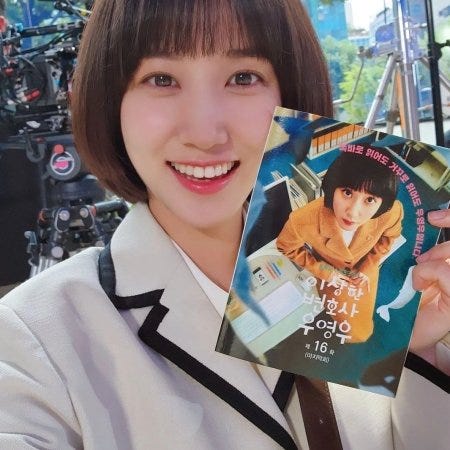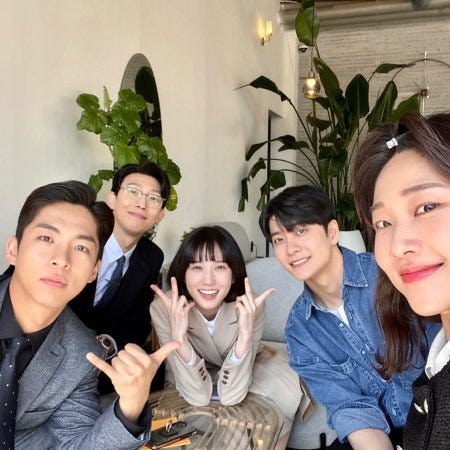Extraordinary Attorney Woo is a South Korean series of sixteen episodes that is currently showing on Netflix. I have scrolled past it many times in the past four months but nothing about it made me think “I must watch this.” Then, when I was walking with a friend last week, she told me that I had to watch it. That it is a remarkable series. Without giving away too much, she just said that the heroine has Autistic Spectrum Disorder. She and her husband watched it and her husband had remarked on how perfect the actress’s movements are.
I have the greatest respect for my friend’s recommendations so I watched the first episode that evening after dinner. I was just blown away and, as I am wont to do when I love something literary or on film, I did research. The main actress, Park Eun-bin, is a well-known and very popular actress in South Korea. She does not have Autism. My research said that the director, Yoo In-shik, wanted her and only her to play Attorney Woo. She was in production of another series, The Kings Affection, which just showed up on Netflix today, and so the filming of Extraordinary Attorney Woo was put off for one year!!!
If you go looking for a short synopsis of this program, you will likely find this description: “Woo Young Woo is a young lawyer with Asperger's syndrome. She boasts a high IQ, an impressive memory and a wonderfully creative thought process, but she struggles with everyday interactions.” Asperger’s is never mentioned in the show (I have watched nine episodes as of this writing). One article said that Woo Young Woo is a savant as well as autistic and that is very rare for autistic spectrum diagnoses. Perhaps 5% have both.
Whatever!! The show is delightful, so well acted, and Koreans are the most gorgeous people on earth unless this is a very rare sample of the population. However, what has been so impactful for me is the direct way the show addresses Autism. How people treat autistic people, address discrimination in general. How people just assume that if you are handicapped, you are a second-class citizen. Each episode’s story line has someone who makes this assumption. So each episode not only has a story with a trial but also has a teaching element about it so that, after nine episodes, I’m very much aware of what it must be like to be autistic and move about in the regular world.
To be clear this series is not about autism but about a young autistic woman trying to navigate a world that isn’t particularly kind to her. There are on-going stories of her parentage, another of a colleague who is determined to get rid of her, and there is a love interest. They all show that autistic people have a hard time not telling the truth, and they tend to be innocent. It’s fascinating watching her responses as these stories unfold while she is also a trial lawyer who works for a very large firm that may have its own moral problems.
Yet, with all this information, I know that I can’t guarantee empathy when I next meet an autistic person. I was in a plane a couple of years ago flying from London or Paris to San Francisco. There was a couple with an autistic boy, who was on the extreme end of the spectrum, seated to my left. The boy, whose age I could never figure out, groaned, yelled, and banged the window at his seat throughout the entire flight. I was beside myself. I kept looking to the parents to do something but they did nothing. At one point, I got up and told the boy he had to be quiet, the people on the plane were trying to sleep. The parents got angry at me for interfering. By the time we’d landed and were standing in line for customs, I had had some rest and I was able to empathasize with the parents. I went up to them and apologised. They apologised to me. I realized they also must have been beside themselves and my interference only shone a light on it.
Will this show educate us on autism, on being kinder to people with disabilities? When writing about this show, the New York Times asked some autistic people, mostly Koreans, what they thought of the show. They got a mixed reaction. In other words, not all autistic people found it helpful. And the feel good element about it distressed some of them. They also noted the small percentage that also has savant abilities. Korean TV does seem to be on the forefront of trying to address discrimination. In 2012, there was a show called The Good Doctor addressing autism. It was dropped, but then picked up by a US company. With the same name, and starring an autistic doctor, it is now going into its 6th season.
I would love to know how many of you have seen Extraordinary Attorney Woo. And what you think about it? I always love your comments and read them all.
A bientôt,
Sara







Thanks for alerting me to this series. I will definitely watch it. You may remember I have a grandson who is on the spectrum. He's twenty, now, and my heart breaks for him. He's intelligent and imaginative, perceptive and kind. But just doesn't get social interaction at all. He tries to interact with people but ends up in a corner looking at his phone.
Another series you might be interested in is a documentary called "Love On the Spectrum", made in Australia, about people on the spectrum who are looking for partners. Touching and painful and sweet. By the way, I'm told Asperger's is not supposed to be used anymore, as it's not a separate
category, but simply "high-functioning" autism, for what it's worth.